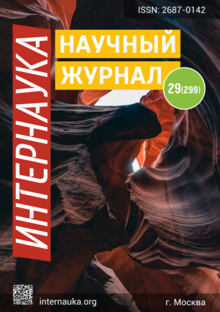THE ROLE OF THE CONTENT CONSUMPTION BY THE CHILD IN UNDERSTANDING ENGLISH LANGUAGE

THE ROLE OF THE CONTENT CONSUMPTION BY THE CHILD IN UNDERSTANDING ENGLISH LANGUAGE
Kuralbek Tulebayev
student, Astana International University,
Kazakhstan, Astana
РОЛЬ ПОГЛОЩАЕМОГО РЕБЕНКОМ КОНТЕНТА В ПОНИМАНИИ АНГЛИЙСКОГО ЯЗЫКА
Тулебаев Куралбек Фархадулы
студент, Международный университет Астана,
Республика Казахстан, г. Астана
ABSTRACT
This scientific article explores the role of the content consumed by the child in the process of understanding the English language. Various forms of content, such as multimedia, games and interactive applications, and their impact on the development of children's language skills are considered. Based on current research and scientific sources, the article discusses the advantages and disadvantages of using various types of content for teaching English in childhood.
АННОТАЦИЯ
Настоящая научная статья исследует роль поглощаемого ребенком контента в процессе понимания английского языка. Рассматриваются различные формы контента, такие как мультимедиа, игры и интерактивные приложения, и их влияние на развитие языковых навыков детей. Основываясь на актуальных исследованиях и научных источниках, статья обсуждает преимущества и недостатки использования различных типов контента для обучения английскому языку в детском возрасте.
Keywords: the role of content, understanding of the English language, children, learning, multimedia.
Ключевые слова: роль контента, понимание английского языка, дети, обучение, мультимедиа.
Introduction
In recent decades, new methods of teaching English have been actively developing, especially for children. An important aspect of these methods is the use of various forms of absorbed content, such as audio and video materials, interactive games, multimedia and applications. This article explores the impact of the content absorbed by a child on his understanding of English and on the development of language skills.
The role of multimedia content in teaching English.
Multimedia content, such as English-language cartoons, audiobooks, video tutorials and interactive applications, provides children with a unique opportunity to immerse themselves in the language environment. Research shows that the use of multimedia content contributes to a better assimilation of vocabulary, grammar and pronunciation.
The influence of games on the development of English in children.
Games, especially those that require communication and collaboration, can significantly improve communication skills in English. Studies show that games help to increase motivation in children and create a positive learning environment.
The impact of interactive applications on the development of language skills.
Interactive apps offering tasks in English can help children improve their written and oral skills. However, it should be borne in mind that the quality of the application and the educational materials included in it play a crucial role in its effectiveness.
Advantages and limitations of using content in English language teaching.
The use of the content consumption by the child in teaching English has many advantages, such as increased motivation, improved understanding and pronunciation. However, it is necessary to take into account possible limitations, such as insufficient quality of content and inefficient methods of its use.
Conclusion
This article emphasizes the importance of the content absorbed by the child in the process of learning and understanding English. Multimedia, games and interactive applications provide numerous opportunities to interact with the language in a natural and exciting environment, but it should be remembered that the choice of content and its quality play an important role in the success of this approach. Responsible selection of multimedia materials, games and applications, as well as support from teachers and parents, can significantly improve learning outcomes. It is also worth considering that immersion in content should be accompanied by adequate educational strategies aimed at systematizing the acquired knowledge and skills.
References:
- Richards, J. C., & Schmidt, R. (2002). Longman dictionary of language teaching and applied linguistics. Pearson Education.
- Mayer, R. E. (2009). Multimedia learning. Psychology of learning and motivation, 51, 85-139.
- Gee, J. P. (2003). What video games have to teach us about learning and literacy. Computers in entertainment (CIE), 1(1), 20-20.
- Hubbard, P. (2013). Apps for Learning: 40 Best iPad/iPod Touch/iPhone Apps for High School Classrooms. Corwin Press.
